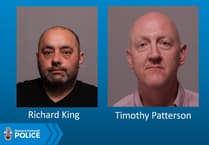THE man appointed to head Devon and Cornwall Police while two chief constables remain suspended could help the force come out of special measures, according to the region’s police and crime commissioner.
Alison Hernandez claims James Vaughan “turned around the performance on recording crime” at Devon and Cornwall Police several years ago when he served as deputy chief constable from 2016 to 2018.
Now, with the force having been formally criticised by inspectors about how it records crime, and a vacuum at the top of the organisation, she wants him to repeat his success.
Coming out of retirement from policing to run Devon and Cornwall on an interim basis, Mr Vaughan is a former chief constable of neighbouring Dorset Police, where he served for nine years including holding the top job between 2018 and 2021.
His appointment follows the suspension of both Will Kerr, who holds the permanent job, in July last year, and Jim Colwell, who had been acting chief constable in Mr Kerr’s place until he was suspended last month.
Mr Kerr is being investigated on suspicion of sexual offences alleged to have taken place before he joined the Devon and Cornwall force. He strenuously denies any wrongdoing.
In November, Ms Hernandez suspended Acting Chief Constable Jim Colwell following separate allegations of misconduct relating to use of a work mobile phone to exchange messages of a “personal nature”.
Ms Hernandez says she worked with her team “around the clock” to resolve leadership challenges and believes Mr Vaughan is “the right man for the job”.
His Majesty’s Inspectorate of Constabulary and Fire and Rescue Service, the College of Policing, a representative from the police and crime panel and an independent person, the chief executive of Cornwall Council, were all involved in the interview process.
Ms Hernandez said: “I identified a number of candidates that would potentially be available, working with His Majesty’s Inspectorate of Constabulary, the College of Policing and anybody else I knew who might know someone.
“Then we selected my preferred person to do an interview, which was James.
“When he was chief constable of Dorset, he was the deputy here for a short time and he turned around the performance on crime recording in six months, so I know that he is a very grippy chief constable.”
The force is still under scrutiny from the organisation that inspects police forces over its recording of crime, although it has improved in other areas, including call handling and management of violent and sexual offenders.
“For two years we have been monitored by HMICFRS [His Majesty’s Inspectorate of Constabulary and Fire and Rescue Services] in terms of the crime recording challenge, and James was able to turn that around for us before,” continued Ms Hernandez. “I knew we needed someone who could drive that improvement quickly, and he is the one. He is the right man for the job.”
She said his experience as a chief constable means that he won’t have to learn on the job.
“I need someone who can build the confidence of the chief inspector at His Majesty’s Inspectorate as well; that they believed the performance was going to happen – and I needed to make sure the public felt confident we have a leader here so they don’t feel anything is different, they can still report to the police, they can still ring the police, that the police officers are doing their job day to day.”
Ms Hernandez said Mr Vaughan could be in the role for up to 18 months, although it could be much shorter.
“We have a break clause on either side, so I can inform James of what is happening and if we are able to bring back the substantive chief constable [Will Kerr] or not.”
Referring to the investigation surrounding Mr Kerr, she continued: “It is taking an awful long time to decide if someone needs to be arrested, actually charged or convicted of something. We are still waiting on [Mr Kerr’s previous employer] the Northern Ireland Public Prosecution Service.”
In the case of acting chief constable Jim Colwell, Ms Hernandez said: “The indicative time frame I have been given by the Independent Office for Police Conduct was nought to three months; so that could be speedy but I can’t guarantee that so have to wait and see what happens with that one.
“Fundamentally it is just not great having two suspended.”
The commissioner has asked Home Secretary Yvette Cooper to “reach out” to the Northern Ireland minister to try and speed up the investigation into Mr Kerr and she has asked to apply for a grant to help pay the salaries of the chief constables who have been suspended on full pay, each around £180,000.
“It all comes from general taxation. It’s all our money at the end of the day, but I am trying the ease the burden for the Devon and Cornwall Police because it is not their fault they are in this situation.”
She said morale had not been affected by the problems in leadership as staff had just got on with their jobs, but added: “The issue where it will really start to affect those individuals is when the organisation starts to slow down even more and they can feel that it is not on their side and drifting and that is a situation we cannot afford to have.”
Mr Vaughan started work immediately after he was appointed, and visited Bodmin, Plymouth and Exeter police stations.
“He’s been very much trying to reassure people, but he says he has had a very warm welcome, no one has given him any snub or grief and I hope he will get a real feel for what is going on in the organisation and can drive it forward over the coming months,” said the commissioner.
“He is someone who communicates with the police and crime commissioner, and that is fundament in building my confidence back into the force.”
She said it had been a tricky year for her at the police and crime panel meetings where her work is scrutinised.
Earlier in the year she hired a deputy commissioner, against the recommendation of the panel which said her choice did not have “sufficient experience” or “meet the minimum requirements” of the post. She later apologised for telling the media of her decision before the panel.
Ms Hernandez has attended all four public meetings of the panel this year which are held at Plymouth City Council offices, and was accompanied by Jim Colwell in October to talk about the improvement in call handling.
On average, panels meet between four and six times per year, with a legal obligation to hold four public meetings a year. Some may meet more often, depending on their work programmes.
“We have the budget coming up at the end of January and I am sure I am going to be asked difficult questions about paying for three chief constables, so I need to make sure they understand how we are funding that and what we are doing to ask the government for assistance,” she said.
Thoughts are now on the funding settlement announced by the government and the police’s part of the council tax.
Ms Hernandez said her office was going through the detail to see if the funding covered all the bases in terms in national insurance rises, pay increments and wage rises.
The police element of the council tax has the flexibility to go up by £14 a year on an average Band D property, she said. Last year it was just shy of £13.
It has risen by just over £100 a year since Ms Hernandez came to office in 2016.
The force also looks likely to receive £2.3 million of funding for neighbourhood policing.
“I’m confident we won’t be absolutely on our knees but we need to work it out in terms of the council tax increase and that is what I will be spending my Christmas doing in readiness for the panel at the end of January,” said the commissioner.
Alison Stephenson

.jpeg?width=209&height=140&crop=209:145,smart&quality=75)



Comments
This article has no comments yet. Be the first to leave a comment.